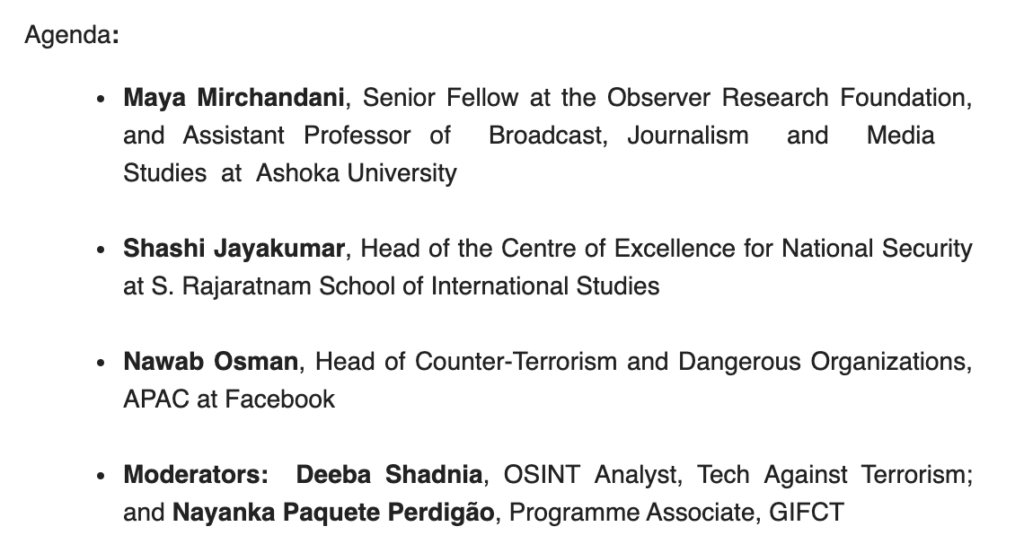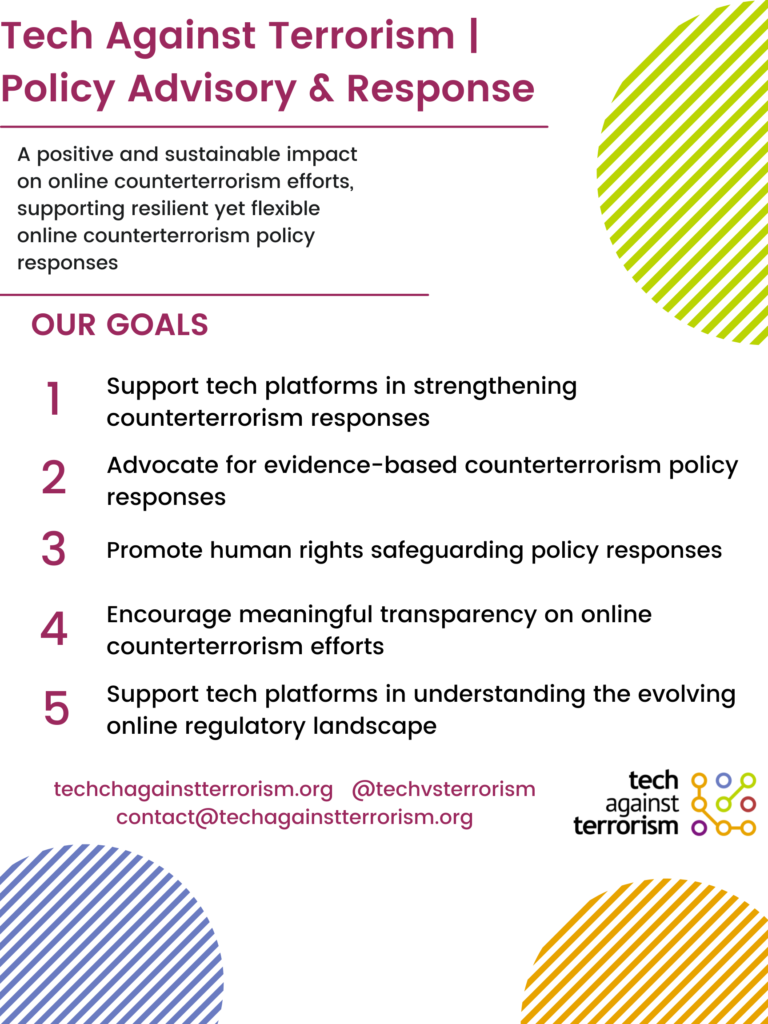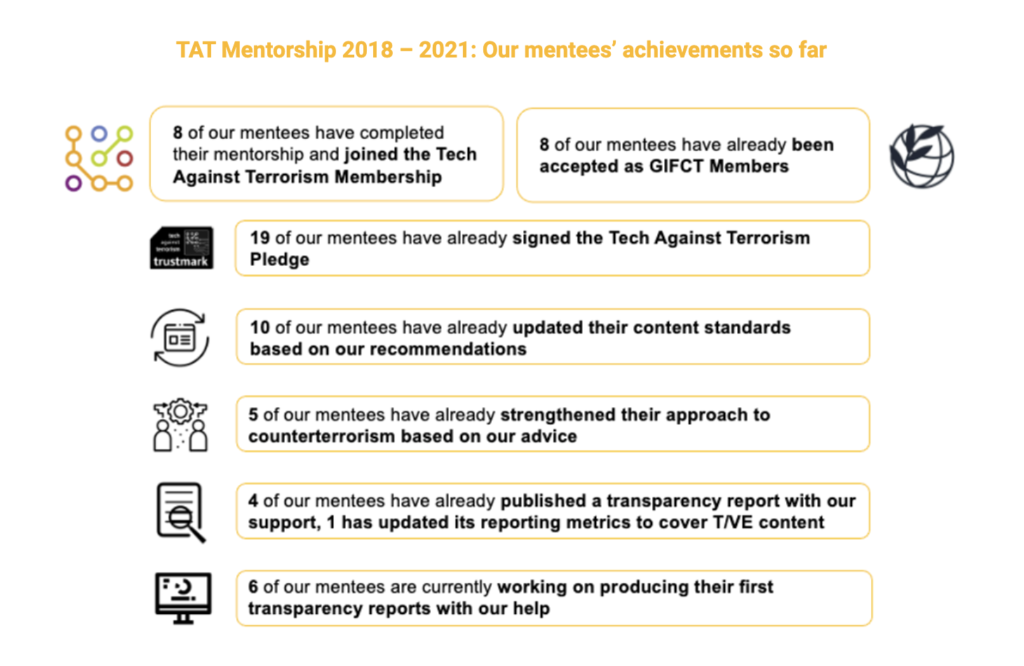Our weekly review of articles on terrorist and violent extremist use of the internet, counterterrorism, digital rights, and tech policy.
Tech Against Terrorism Updates
- Tech Against Terrorism is delighted to have opened registration for our upcoming webinar, “The Nexus Between Violent Extremism and Conspiracy Theory Networks Online”, to be held on 17 March at 5pm GMT. This webinar features as a part of our TAT & GIFCT E-Learning Webinar Series and an agenda will be coming soon. Please register here.
- We would like to thank those of you who attended the February sessions of the Terrorist Content Analytics Platform (TCAP) Office Hours for your questions and feedback. If you were unable to attend our office hours but would like an update on our development of the platform, please register here.
Top Stories
- Facebook has responded to the first set of recommendations published by the Oversight Board in January, which details how they can improve their content moderation processes.
A key part of Tech Against Terrorism's support for smaller tech companies relates to providing policy advice and practical recommendation to inform tech companies' counterterrorism policies and transparency efforts. If you want to hear more about this please get in touch at contact@techagainstterrorism.org.
- Australia’s Online Safety Bill 2021 has entered parliament, only 10 days after the public consultation on the Bill closed. We tweeted about it here.
Tech Against Terrorism participated in the consultation. To read our full submission and recommendations, see here.
- Ranking Digital Rights has published its 2020 version of the digital rights index where they evaluate 26 of the world’s largest digital platforms and telecommunications companies on their policies and practices that affect human rights, including people’s freedom of expression and privacy.
- Facebook has announced that it will ban the Myanmar military (Tatmadaw) and its state and media entities from Facebook and Instagram.
- TikTok has released its latest transparency report that covers the second half of 2020 (July 1- December 3). It elaborates on the content removed under its Terms of Service as well as information on TikTok’s work to counter misinformation related to COVID-19 and the US elections in 2020.
- Following last week’s events where Facebook suspended news content across its platform in Australia in response to a new law in the country, Facebook announced that it would restore news content following revisions to the Code by the Australian Government. The law has now been passed, and forces Google and Facebook to pay for hosting news content on their platforms in Australia.
- The Government Communications Headquarters (GCHQ), the United Kingdom’s intelligence and security organisation, has published its first report on how they use AI to counter child sexual abuse, disinformation and human trafficking.
- The International Centre for Counter-Terrorism has released its third part of the “Handbook of Terrorism Prevention and Preparedness”, in which authors explore methods of disruption that hinder terrorist groups’ capacity.
Tech Policy
- ePrivacy Strikes Back: Diego Naranjo from European Digital Rights (EDRi), a digital rights advocacy group, provides a status update on the ePrivacy regulation proposed by the EU Commission back in 2017. Member States have agreed upon a position two weeks ago, which means the “trilogues”, which are negotiations between the European Parliament, the European Commission, and the Member States, can begin. EDRi advocates that the new ePrivacy regulation should ensure that mass surveillance is made illegal by law; privacy by design and default remain a backbone of the Regulation; cookie walls are teared down; and that neutral and harmonised language is used to future proof the legislation. (Diego Naranjo, EDRi, 24.02.2021).
- Facebook Latest Proposed Policy Change Exemplifies Trouble Moderating Speech: This article by Jillian York and David Greene analyses how Facebook’s latest proposed policy change to how they define “Zionism” brings wider issues with content moderation to light. In the article, they stress how issues with defining hateful speech, as well as the different uses of the terms associated with Zionism, makes moderation at scale nearly impossible. (York, Greene, Electronic Frontier Foundation, 04.02.21).
- We are also listening to Lawfare’s latest podcast episode where Evelyn Douek, Quinta Jurecic and Rasmus Kleis Nielsen discuss Facebook’s reaction to Australia’s Bill that requires big tech companies to pay for news on their platforms, as well as what this holds for the future of journalism.
Islamist Terrorism
- Al-Qaeda is Being Hallowed to its Core: Barak Mendelsohn and Colin Clarke discuss the setbacks experienced by al-Qaeda over the last year. They argue that the significant leadership losses, the increased decentralisation of the group and the lack of strategic direction have led to the demise of al-Qaeda. The article also emphasises that due to the lack of central command and leadership, branches have gained significant momentum and independence, which can be seen in the success al-Shabab and Jama’at Nusrat al-Islam Muslimeen (JNIM) have had. (Mendelsohn & Clarke, War on the Rocks, 24.02.2020).
For any questions, please get in touch via:
contact@techagainstterrorism.org
- News (241)
- Counterterrorism (54)
- Analysis (52)
- Terrorism (39)
- Online Regulation (38)
- Violent Extremist (36)
- Regulation (33)
- Tech Responses (33)
- Europe (31)
- Government Regulation (27)
- Academia (25)
- GIFCT (22)
- UK (22)
- Press Release (21)
- Reports (21)
- US (20)
- USA (19)
- Guides (17)
- Law (16)
- UN (15)
- Asia (11)
- ISIS (11)
- Workshop (11)
- Presentation (10)
- MENA (9)
- Fintech (6)
- Threat Intelligence (5)
- Webinar (5)
- Propaganda (3)
- Region (3)
- Submissions (3)
- Generative AI (1)
- Op-ed (1)


